RESEARCH | STATE OF MARKETING
Top marketing trends in 2025
Learn how AI, social media and generational marketing are shaping the state of marketing plus how consumer preferences will transform future strategies.
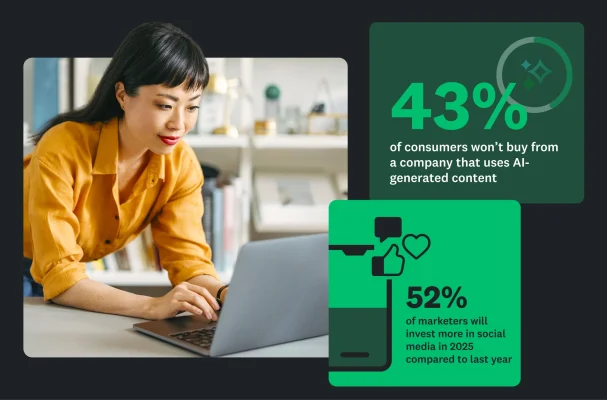
2025 feels like a restart for marketers
Social media and AI appear to be game-changers for marketers who are willing to dive in. However, consumers have a different point of view and some real concerns about how marketers use these new tools to connect and promote their offerings.
In two new studies – powered by SurveyMonkey, the AI-powered platform for surveys and forms, built for business, loved by users – we uncover what marketers are most excited about and what consumers think about their plans.
How to thrive in 2025
Insights to power your marketing strategy
AI: a balancing act that marketers have to get right
Although AI is helping marketers meet goals and stay competitive, consumers believe that AI-generated content lacks authenticity and are sceptical about its value.
Social media: where to invest to harness its growing influence
In the high-velocity world of social media, choosing the right platform, influencer and message for a specific target audience is a complex, high-wire act.
Marketing biases: look outside your comfort zones
It’s easy to market to Gen Z if you’re in Gen Z. But marketers need to look beyond their own generational experiences and really understand their customers’ sweet spots.
Bright spots: collaboration and education
Marketers are rolling up their sleeves and doing what they need to do to support growth: gaining new skills and aligning with teams company-wide.
AI: a balancing act that marketers have to get right
As marketers embrace AI, the need for more authentic and human connections with customers will grow.
62%
of marketers believe that AI will get better at generating content
52%
of marketers say they understand their target audience better than AI
79%
of consumers say a human understands them better than AI
❶
Marketers are (mostly) bullish on AI
AI is making an impact, with marketers reporting positive outcomes. They agree that AI helps them stay competitive and meet their goals while offering a better understanding of their target audiences.
–
A third of marketers use AI to generate content, which is the No. 1 use case.
–
AI-generated content includes writing and editing, generating ideas, designing images and improving SEO.
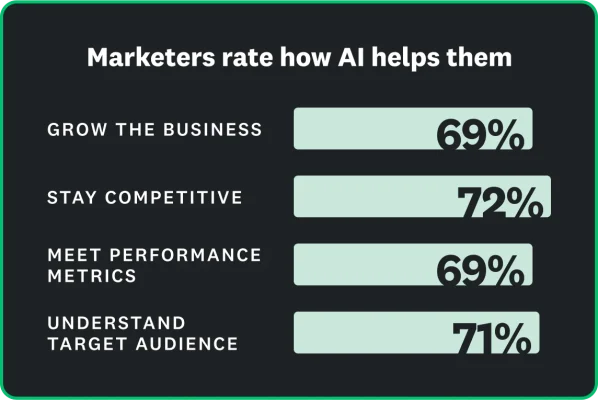
❷
AI: the gap between marketers and consumers
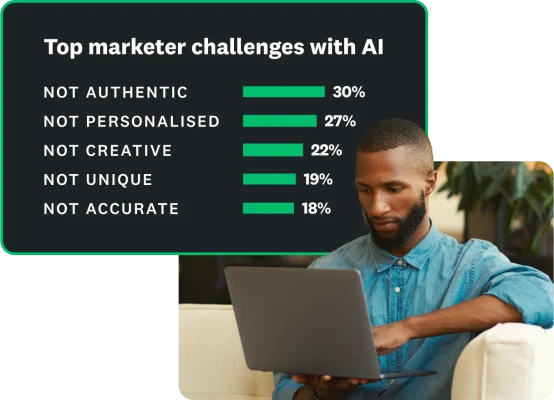
Marketers believe in their skills vs. AI, with 52% of them saying they are better at understanding their target audience than AI is. Their list of complaints about AI range from a lack of authenticity and creativity to mistakes and inaccuracy.
–
Four out of 10 marketers are cautious about using AI for customer-facing content and 38% rate it as fair or poor at personalisation.
Consumers agree: in a separate study, almost half of consumers believe that AI is not authentic and 28% say it lacks creativity.
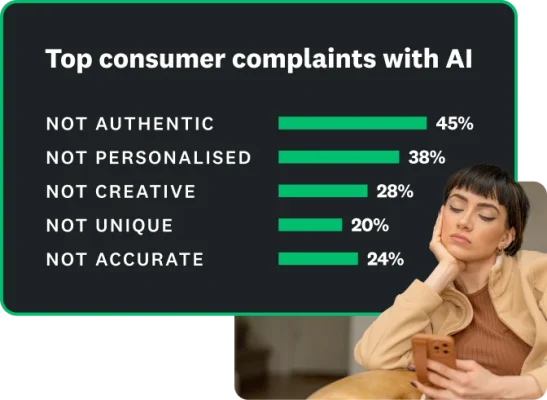
❸
Marketers know they need to get on board
However, 62% of marketers believe that AI will continue to improve in terms of generating content and three quarters are aware that they need to up their AI skills.
–
While 42% of marketers say they are just keeping up with AI, almost a third say they are staying ahead of the curve.
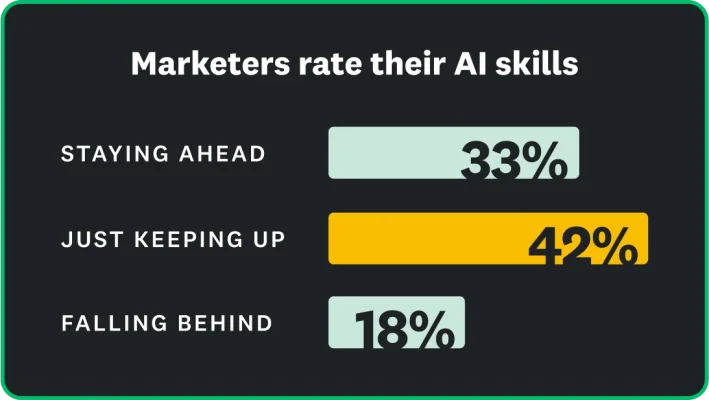
❹
Consumers aren’t sold on AI
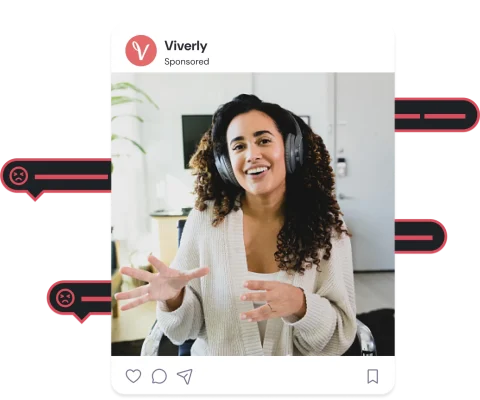
Consumers are very aware of AI, with nearly three out of four (71%) consumers saying they’ve seen more AI-generated marketing content in the last year. When asked to compare, consumers prefer human-created content.
–
Almost half (46%) of consumers said they would have a negative perception of companies that used AI to generate content and 43% said they are less likely to purchase from a company that uses AI.
“The smartest marketers are using AI to work faster, spark new ideas and analyse data more efficiently. But the best marketing still relies on human creativity and empathy. AI can help generate content, but it’s the marketer’s job to make it resonate.”
PRIYA GILL
HEAD OF GLOBAL MARKETING, SURVEYMONKEY

2025 promises to be a wild year for social media, yet marketers plan to invest more than ever before.
74%
of marketers say social media is important to their marketing strategy
52%
of marketers will invest more in social media in 2025 compared to last year
58%
of consumers believe the hype when a product goes viral
❶
Marketers up their social media investments
Social media tops the list of marketing strategies, with three out of four marketers saying it’s important.
–
Why? It supports so many marketing goals: 40% of marketers use social media to increase brand awareness; 39% to increase customer engagement; 36% to promote products; and 31% to build community and loyalty.
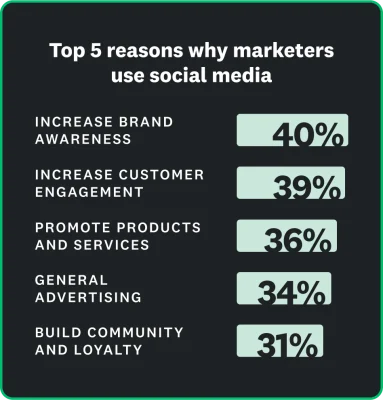
❷
The evolution of the influencer
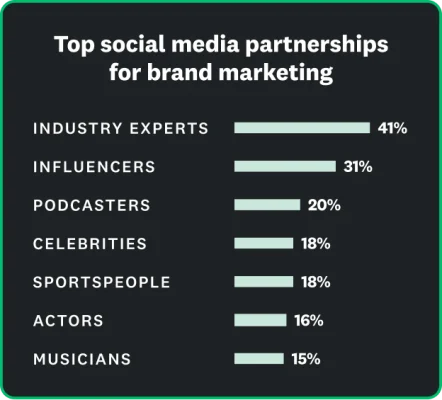
Industry experts are the most important influencers, with 41% of marketers saying they prefer working with experts for brand marketing.
–
Influencers who have developed their reputations on social media are seen as more authentic than celebrity or sportsperson influencers by more than 10 percentage points.
❸
Marketers over-index on celebrity influencers compared to consumers
In our study, over half (55%) of consumers want to hear from industry experts for product endorsements, compared to 41% of marketers.
–
Marketers are more likely to use social media influencers, with almost a third (31%) saying they’re important endorsements, compared to 21% of consumers.

❹
Going viral captures consumer attention
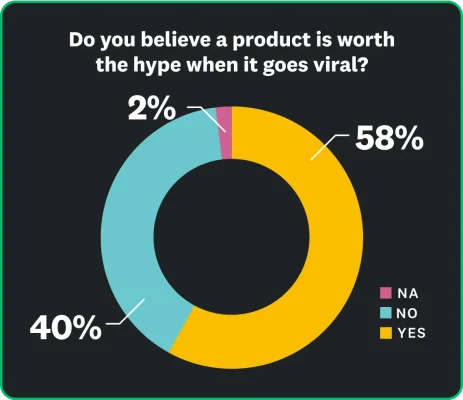
Over a third (36%) of marketers use social media to promote products and services, and with good reason.
—
Almost half of consumers have purchased a product based on an influencer’s recommendation and 58% of consumers believe the hype when a product goes viral.
–
KEY TAKEAWAY
Even if your product doesn’t go viral, word-of-mouth influence – combined with social media reach – can help propel your brand higher.
Is there a disconnect between marketers and consumers?
In a new study, we explore how consumers feel about AI and social media and uncover the gaps between marketers’ plans and consumer preferences.
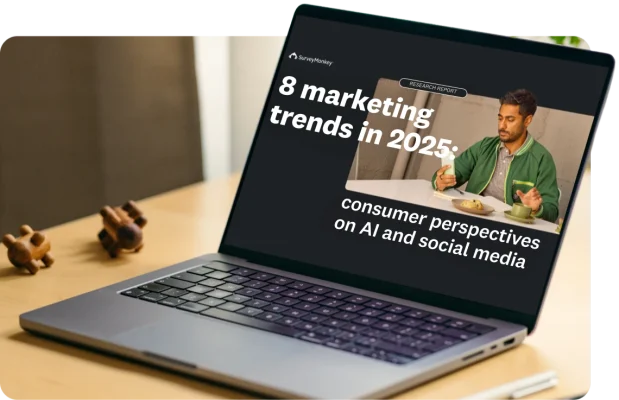
Marketing biases: look outside your comfort zone
We identified some big differences in how marketers prioritise how and where they target their ideal users based on their personal generational identity.
50%
of marketers target their audience by generation
82%
of Gen Z/millennial marketers say AI helps them meet key metrics
86%
of Gen Z marketers say social media is important, compared to 68% of Gen X marketers
❶
Are marketers marketing to themselves?
When we asked marketers from different generations which age group was most important to their company’s business, they invariably chose their own.
—
Gen X are more than twice as likely to believe that their own generation is most important, especially compared to Gen Z.
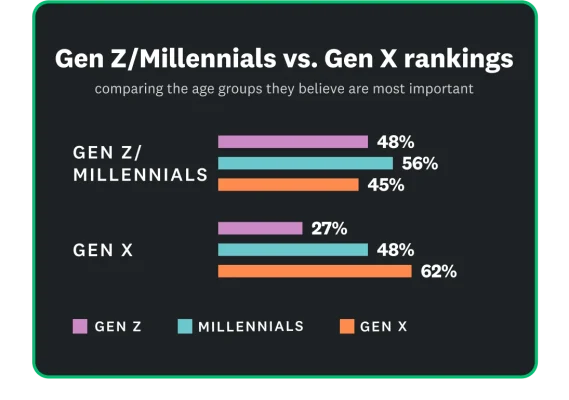
KEY TAKEAWAY
Younger marketers are more open to collaborations with a wider variety of outside influencers, including podcasters, celebrities, sportspeople and musicians. This probably reflects the endorsements they value as consumers.
❷
Age can influence marketing decisions
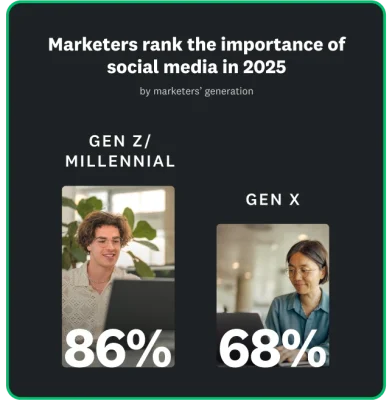
Younger marketers appear to have more faith and comfort in using AI and social media. Two-thirds (66%) of Gen Z/millennial marketers are confident about using AI for customer-facing content, compared to only 56% of Gen X.
—
In addition, 82% of Gen Z and millennial marketers say AI helps them reach their goals, compared to 68% of Gen X. The younger cohort also believes that social media is more important by 18 percentage points.
❸
Targeting by generation delivers better outcomes
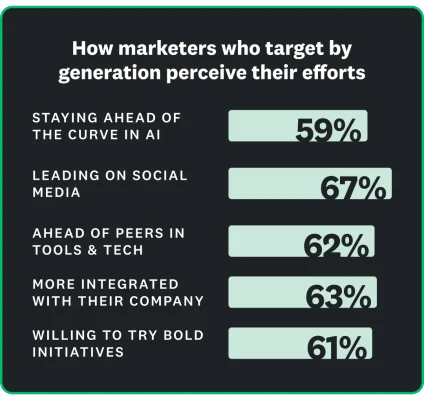
In our study of marketers, we found that only half target consumers by generation in their marketing activities.
How effective is targeting by generation? We compared the responses of the 50% of marketers who target by generation with those who don’t for a variety of attributes.
–
Marketers who target by generation scored themselves as more likely to be ahead of their competitors in terms of AI, social media presence, their use of new technologies and their willingness to make bold moves.
“Marketers need to be aware of their own biases and look beyond their comfort zone to truly understand customers. Challenge yourself, be curious and look deeper into the data. That’s where you’ll find the truth about customers, which might be very different from your expectations.”
–
WENDY SMITH
SENIOR MANAGER, RESEARCH SCIENCE, SURVEYMONKEY
Bright spots for 2025: more resources and collaboration anchor growth
Marketing momentum is all about sharp skills, smart tools and strong teams.
40%
of marketers say they have more resources in 2025
80%
of marketers say they are either ahead of their peers or on a par with the competition
44%
of marketers believe that improving their skills and education will drive growth
❶
Marketers have more resources
For the first time in a while, marketers say their companies have upped their investment.
–
40% of marketers say they have more resources this year than last year.
–
Younger marketers are even more optimistic about available resources, with over half (51%) of Gen Z and millennial marketers saying they have more this year than in 2024.
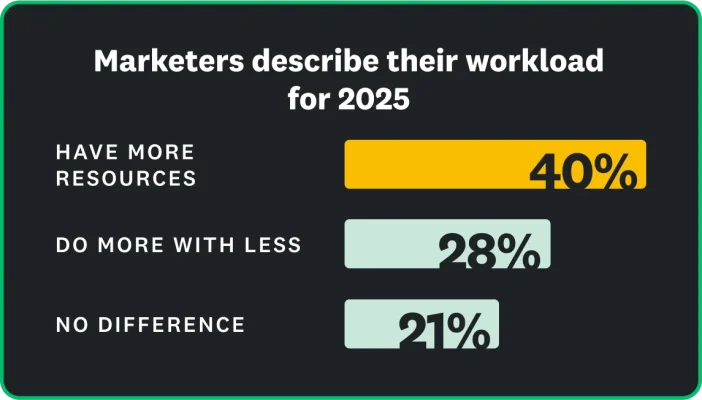
❷
A willingness to step out of the marketing box

51% of marketers say they’re more integrated with other teams in 2025 and 55% say it’s most important to be a jack of all trades for most skills and a specialist in some.
KEY TAKEAWAY
Marketers appear willing to roll up their sleeves in 2025 to deal with a more competitive market. The ‘stay in your lane’ mentality may have given way to working together across the organisation and personally learning new skills.
❸
Learning new skills to drive growth
Marketers are motivated to adopt new skills to stay competitive. In our study, almost half of marketers (44%) said they would rely on new skills and education to drive growth, which is the No. 1 response. And this focus on education may have paid off.
—
41% of marketers feel they’re ahead of their peers in terms of adopting new technologies and learning new skills.
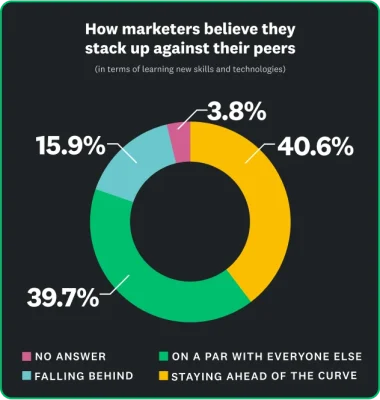
KEY TAKEAWAY
Levelling up your skills and contributions starts with insights. Do you want to be the marketer who uncovers something new about your market, brand or strategies? If so, launch a survey using our purpose-built templates.
Explore our survey solutions for marketers
METHODOLOGY
¹This SurveyMonkey study was conducted between 9 January and 16 January 2025 among a sample of 416 self-identified marketing professionals in the U.S. Respondents for this survey were selected from the more than 2 million people who take surveys on our platform each day.
²This SurveyMonkey study was conducted between 9 January and 16 January 2025 among a sample of 2,329 adults in the U.S. Respondents for this survey were selected from the more than 2 million people who take surveys on our platform each day. The modelled error estimate for this survey is plus or minus 2.5 percentage points.
Social media: where to invest to harness its growing influence